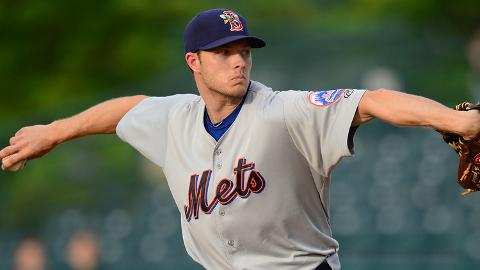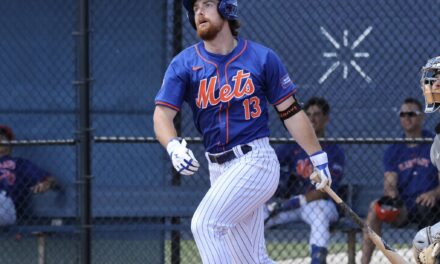
Last week, the Mets the added left-hander Steven Matz and right-handers Jeff Walters, Jacob deGrom and Erik Goeddel to the 40 Man Roster, protecting those players from being selected in next month’s Rule 5 Draft.
Since then, Goeddel has spawned more than a dozen emails to MMO as Mets fans were curious to know more about this talented pitching prospect who the Mets feared would be swiped up in a heartbeat if left unprotected.
Erik was kind enough to share some of his time with us and tell our readers a little bit about himself. Right off the bat we saw a highly motivated and goal-oriented young man. “It has been my dream my entire life to be a major league baseball player”, says Goeddel.
The Mets selected the UCLA star in the 24th round of the 2010 Amateur Draft. Goeddel dealt with a series of arm and shoulder in his first two pro seasons with the Mets, but after a promotion to Advanced-A St. Lucie in 2012, he began to put all that behind him.
Goeddel started 20 games and went 5-6 with a 3.41 ERA while registering 98 strike outs in 102.1 innings of work. I asked him how he felt his arm held up after dealing with the various arm injuries. “I think the little injuries I had my first couple years in pro ball were just due to the rest of my body being a little stronger than my arm. Now I feel like my arm is back to its old strength and flexibility, and I think I’ll be able to stay healthy,” says Goeddel.
In 2013, he made his way up to the B-Mets and started all 25 games that he appeared in. He had by far the most consistent pitching performance of his brief minor league career. He was 9-7, with a 4.37 ERA and 125 strikeouts in 134.0 innings of work. He also was a big catalyst in the B-Mets history-making season and playoff run.
“Its always great playing on a good team,” says Goeddel. “The B-Mets hadn’t made the playoffs for a while so when we started playing well and got in first place, the city really got behind us. It was exciting, and was a good feeling giving the B-Mets fans something to cheer about.”
Truly a great talent in an organization that is stockpiling a fine collection of pitching prospects. Goeddel is on track to make a name for himself within the organization and as long as he continues along his path, his lifelong dream of becoming a major league pitcher, will finally be his reality – and the Mets’ reality as well.
Enjoy our conversation:
David – Is there something that you would like to share with the Mets fans that they do not already know about you? Your interests, hobbies outside of baseball?
Erik – I am kind of a golf fanatic. I play almost every off day during the season and try to play as often as i can in the off-season.
David – While playing college baseball at the UCLA, who can you say was a major influence in your baseball career?
Erik – Here are a couple things about playing at UCLA that influenced my career. Firstly, head coach John Savage… I can’t say enough good things about him. He taught me a ton about the mental approach to pitching, everything from getting a consistent routine to knowing what to do in order to stay calm when things aren’t going well. The second thing that influenced my baseball career was just the teammates I had at UCLA. So many of those guys are extremely hard working, and just being around that all the time motivated me to work harder. Also, the constant competition for playing time on a team with that much talent was great practice for the kind of pressure and competitiveness that every player encounters in professional baseball.
David – What can you share about your experience playing in the 2010 College World Series?
Erik – It was absolutely incredible. Best baseball experience of my life. I imagine only playing in the Big Leagues could beat it.
David – Did you have a favorite player growing up and if so, did you model your game after him?
Erik – Ken Griffey Jr was my favorite growing up. I definitely modeled my game after him but unfortunately I only got about 10 at-bats this year. (laughs).
David – On the day that you were signed by the Mets in 2010, what was your reaction and who was the first person you shared the news with?
Erik – When I signed my dad was there with me, so I guess he was first. But after that I think I called my college roommates and coach Savage. It was definitely an exciting day, but on the flip side it was tough to leave UCLA, I had a great time there and was leaving a bunch of guys who had been my teammates for the previous three years.
David – In 2010, you played in your first pro baseball game with the Gulf Coast Mets, what was the experience like and how can you compare it to playing in college?
Erik – It was completely different than college. First off most of the team didn’t speak English, so that took some time to adjust to. But everyone seemed to have so much talent, but being in rookie ball, a lot of the guys weren’t very refined yet due to their age. A little different than college where there are a fair number of guys that maybe don’t have that much talent, but use every bit of their potential and are good baseball players.
David – In 2011, you recorded your first win with Savannah, what was the feeling like to get that milestone under your belt?
Erik – That was a huge step for me. I was a reliever in college and hadn’t started a game before Savannah in over four years, so it was great for my confidence to get a win and get going in the right direction.
David – Who has impressed you the most this past season, and who should Mets fans be most excited about seeing in the future?
Erik – Another thing about being on a good team, is that a lot of teammates impress you. For me though, I would say I was most impressed by Wilfredo Tovar. He is absolutely unbelievable with his glove. He makes plays that most guys wouldn’t even get to, and makes them look easy. And on top of that, he seemed to become a better hitter every month.
David – Is there a Met manager or coach who has made an impact in your approach to the game and helped elevate your performance?
Erik – I’ve had two seasons with Glenn Abbott as my pitching coach, and one with Phil Regan. Both of them are incredible coaches, and I feel extremely lucky to have been able to work with them both. Anybody who watched me pitch in college, and then watched me pitch today would see a huge difference, and most of the improvements I’ve made in that time have been thanks to those two coaches.
David – With the success you’ve had in the minors; are you on track with the goals you’ve set for yourself? And what are your expectations for 2014?
Erik – I am happy with how I have done so far in my career. I feel like I’ve made improvements in my game every year, and that’s what its all about. One of the hardest things baseball players have to deal with is the fact that you can’t directly control promotions within an organization. All you can do is go out and work hard every day, and do everything in your power to continue to improve, and to do as well as you can. I used to have goals about being at certain levels in the minors by a certain time, but as I’ve grown as a player, my goals have changed. Now all I try to do is continue to improve as much as I can, and I feel like if I can do that then eventually I’ll get a chance to play in the big leagues.
David – What do you specifically need to work on and improve upon, in order to be ready to compete on the big stage?
Erik – I think at this point in my career I just need to get more consistent with my command, and get better at reading hitters so I can select what pitches I throw a bit better. For the most part I feel like the command of my pitches is as good as a big leaguers, but what I need to improve upon in about once a game I will have a four or five pitch walk. I will hit my spots for ten hitters in a row, then just lose it for a hitter, and then have good command again. I’m not saying this kind of thing never happens in the big leagues, but most of the guys up there have more experience, or have found a way to make the adjustment and get on track after maybe going 2-0 on the hitter, instead of 4-0 and walking the guy and then fixing the problem. I had been struggling to get a consistent change up for a while, but this last season I feel like I finally started to get a good change up. Now I just need to get better at knowing the right times to throw it, and learning how to use it to make my other pitches better.
David – How will you prepare over the winter; can you describe your workout regimen?
Erik – I don’t do much for the first 3-4 weeks. Just kind of rest and let my body recover, because after 142 games I always have a few aches that a little rest does wonders for. After that I start lifting weights pretty intensely. I’m naturally a skinny guy, so I have to lift in order to keep weight on my body. I lift hard all year with the exception of those couple weeks of rest. Usually I’ll start throwing again in late November. First just light catch, then working up to long toss, then starting bullpen session in early January so I’m ready to go when spring training starts.
David – Anything you would like to tell the Mets fans?
Erik – Just that the team seems to be headed in the right direction, and the next few years should hopefully be good ones for Mets fans.
David – Thank you Erik for allowing me to share your story with our readers.














